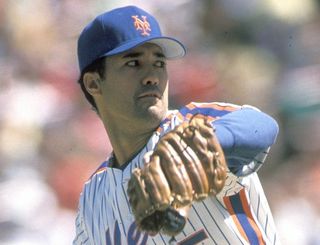Media ‘Darling’: Mets’ Astute Analyst Pitches Book

I had the opportunity to chat with Ron Darling, analyst on the New York Mets’ TV broadcasts, as well as on TBS and MLB Network, for a Q&A that runs in our June 20 issue. But Darling, known as an insightful broadcaster, had plenty of other stuff to say—about his new book, Game 7, 1986: Failure and Triumph in the Biggest Game of My Life, about a broadcaster’s relationship with today’s players, and what makes the Mets’ booth work so well.
The Mets’ on-air team—Darling, his former teammate Keith Hernandez, and play-by-play guy Gary Cohen—is the best around, at least in my opinion. But since I’m biased, I reached out to veteran sports media reporter Bob Raissman of the New York Daily News. Raissman says the SNY booth is “right up there” with the elite crews. “They’re probably one of the top booths in the major leagues,” he says, “and certainly the best in New York.”
Raissman describes Darling as a “thinking man, but entertaining.” He’s a Yale grad who had other career goals in mind when “baseball got in my way," says Darling. I offered him my take on two-thirds of the Mets booth: Hernandez is like an opinionated teen, outspoken and unfiltered, and Cohen a patient father. I asked Darling where he fell in this family dynamic.
“I’m like Dag Hammarskjöld or Philip Habib,” he said, offering up the names of two famed diplomats that, honestly, I had to look up. “When things get a little sticky, I’m good for getting us all back to the middle.”
The book offers up biographical info on Darling and his career but is mostly a tick-tock of Game 7 in the 1986 World Series. Darling was magnificent in starting Games 1 and 4 against the Red Sox, but faltered in 7. While the Mets won, the poor showing stayed with him for years, even decades.
He said he had three options for dealing with the misery. “Go see someone and spend $150 an hour, write a book, or, as a friend suggested, scotch,” Darling quipped.
I asked Darling, who is an analyst for post-season games on TBS, about how the preparation differs for regular season and playoffs. The regular season, he said, is a “six-month tale”, while the post-season offers a new narrative most every night.
The post-season’s ad loads limit his mic time. “In the business of sports, regular season advertisements are very important, but in the post season, sometimes I think they’re most important,” he says. “So you’ve really got to find your voice to say what you’re going to say much quicker than the soliloquies I sometimes have on the Mets’ broadcasts.”
One thing I’ve respected about the Mets booth is that, before the magical 2015 season, when the Mets would conclude yet another desultory year, the on-air trio stayed on top of their game—fresh and insightful and funny—right until the bitter end. I suggested that it’s probably more fun to come to the ballpark when the team is playing well, but Darling countered that team success does not affect the booth’s mood or performance.
“We have to win a hundred games every year, our broadcast,” he says. “It doesn’t matter if they don’t. We have to be a championship broadcast every year—that’s how I look at it.”
Finally, we got to talking about the transition from player to press, and the challenge of entering the clubhouse as part of the media, not part of the team. Darling recalled his playing days, hanging out with then-Mets announcers Ralph Kiner, Tim McCarver and Bob Murphy, whether it was dinner or beers or even karaoke. Not so much anymore.
“Today’s player really has no interest in seeing me,” he says. “I thought when I first started this job, there would be a natural kind of fraternity—I used to play, you’re playing now. But today’s player really has no interest in what we do, no interest in any knowledge we may have.”
It may not just be ballplayers. “It’s hard to get my grown children to call me or text me,” says Darling. “It might be generational.”
Twenty one years after his playing career ended, he runs with Cohen, Hernandez and his production crew now. “I eat every meal with them, walk to the ballpark and back with them,” he says. “Those are my new teammates.”
B&C’s “The Five Spot” interview with Ron Darling appears in the June 20 issue.
Broadcasting & Cable Newsletter
The smarter way to stay on top of broadcasting and cable industry. Sign up below
Michael Malone, senior content producer at B+C/Multichannel News, covers network programming, including entertainment, news and sports on broadcast, cable and streaming; and local broadcast television. He hosts the podcasts Busted Pilot, about what’s new in television, and Series Business, a chat with the creator of a new program, and writes the column “The Watchman.” He joined B+C in 2005. His journalism has also appeared in The New York Times, The Philadelphia Inquirer, Playboy and New York magazine.

